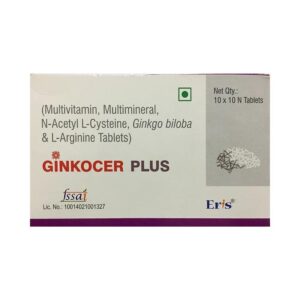GINKGO BILOBA + GINKGOFLAVON GLYCOSIDE
Ginkgo Biloba: Ginkgo biloba is a herbal supplement commonly used for its potential cognitive and circulatory benefits. It is derived from the Ginkgo biloba tree, one of the oldest living tree species on Earth. The extract from its leaves is primarily used for medicinal purposes.
Ginkgo biloba is believed to work through several mechanisms of action. It contains active compounds called flavonoids and terpenoids, which act as antioxidants and help protect cells from damage caused by free radicals. Ginkgo biloba is also thought to improve blood flow and enhance neural activity by dilating blood vessels and reducing platelet aggregation.
The recommended dose of Ginkgo biloba extract varies depending on the specific product and the condition being treated. Generally, a typical dose ranges from 120 to 240 mg per day, divided into two or three doses. However, it is crucial to follow the instructions on the product label or consult a healthcare professional for accurate dosing information, as different brands may have different concentrations and recommended doses.
While Ginkgo biloba is generally considered safe for most people when taken in recommended doses, it can still cause some side effects. Common side effects may include headache, dizziness, upset stomach, and allergic reactions, such as skin rash. Some individuals may also experience bleeding or bruising more easily, particularly if they have underlying bleeding disorders or are taking blood-thinning medications.
It is important to note that Ginkgo biloba can interact with certain medications, such as blood thinners, antiplatelet drugs, and some antidepressants. Therefore, it is advisable to inform your healthcare provider about any medications or supplements you are taking before starting Ginkgo biloba.
As with any herbal supplement, it is essential to use Ginkgo biloba under the guidance of a healthcare professional and to be aware of the potential risks and benefits associated with its use.
Ginkgoflavon Glycoside: Ginkgoflavon Glycoside is a drug derived from the Ginkgo biloba tree. It is commonly used to enhance memory, improve cognitive function, and treat conditions related to poor circulation such as tinnitus (ringing in the ears) and vertigo.
The exact mechanism of action of Ginkgoflavon Glycoside is not fully understood. However, it is believed to work by increasing blood flow and oxygen supply to the brain, as well as acting as an antioxidant to protect against damage from free radicals.
The typical dose of Ginkgoflavon Glycoside is 120-240 mg per day, usually divided into two or three doses. It is commonly taken orally in the form of tablets or capsules.
While Ginkgoflavon Glycoside is generally well-tolerated, it can cause some side effects in certain individuals. These side effects may include headache, dizziness, stomach upset, constipation, and allergic skin reactions. In rare cases, it may cause bleeding complications, especially in individuals taking anticoagulant medications or those with bleeding disorders.
It is important to note that Ginkgoflavon Glycoside may interact with certain medications, including blood thinners, anticonvulsants, and antidepressants. Therefore, it is crucial to consult with a healthcare professional before starting Ginkgoflavon Glycoside to ensure it is safe and appropriate for you.


